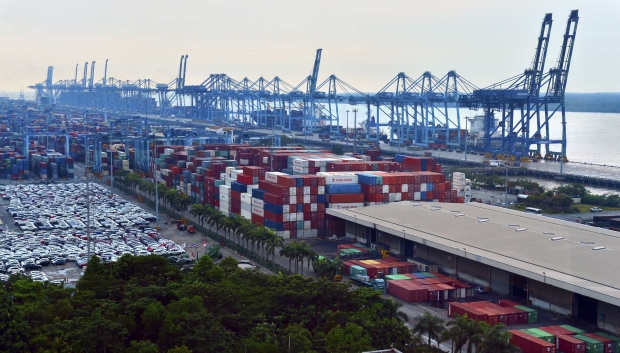
Tariffs on fruit shipped to ports in Asia, like Port Klang, in Malaysia, would be removed under new TPP changes. (Courtesy Dean Calma, IAEA)
The proposed Trans-Pacific Partnership (TPP) will cause a significant number of tariffs on fruit exported to many Asian nations by the United States to go away immediately or within several years, according to an analysis released today by the U. S. Department of Agriculture.
The TPP region accounts for nearly $63 billion in U.S. food and agricultural exports, according to USDA. The agreement expands market access into Canada, which already has a free trade agreement with the United States, and grants new and enhanced market access in Japan, Vietnam, Malaysia, New Zealand, Brunei and other countries.
The agreement does not include China. Nor does it include India.
Congress and lawmakers in 11 other countries must approve the agreement before it can take effect. Some U.S. unions and other groups and Democratic presidential frontrunner Hillary Clinton opposed the deal.

President Barack Obama and Agriculture Secretary Tom Vilsack talk to Brownfield Ag News on October 6, 2015, about the Trans-Pacific Partnership (TPP) in Washington, D.C. (Courtesy Pete Souza, The White House)
Here are highlights of the agreement released today by the USDA:
Horticultural Products
Cherries, Apples, Pears: In 2014, the United States exported $915 million of fresh apples, cherries, and pears to the TPP region and $1.8 billion to the world.Japan: Japan’s 8.5-percent tariff for fresh cherry imports will be cut in half upon entry into force of the agreement, and then eliminated in six years. Japan’s 17-percent tariff for fresh apples will fall 25 percent immediately upon implementation and be eliminated in 11 years. Japan’s current 4.8-percent tariff on fresh pear imports will be eliminated immediately upon implementation.
Malaysia: Malaysia’s five-percent tariffs on fresh apples, cherries, and pears will be eliminated immediately.
Vietnam: Vietnam’s 10-percent tariffs on apples, cherries and pears will be eliminated in three years.
United States: The United States’ tariffs on imported fresh apples, cherries, and pears, which are as high as 0.3 cents per kilogram (approximately 0.2 percent ad valorem equivalent), will be eliminated immediately.
Other Fruit
In 2014, the United States exported $1.6 billion of fruit other than citrus fruits, apples, cherries, and pears to the TPP region and $2.2 billion to the world.Japan: Japanese tariffs, as high as 17 percent, will be immediately eliminated for many products, including grapes, avocados, strawberries, raspberries, blueberries, cranberries, kiwi, watermelon, and papaya. Tariffs for the vast majority of other products in this category, currently as high as 17 percent, will be eliminated in 11 years or less.
Malaysia: Malaysia will immediately eliminate tariffs on the majority of these fruits, which currently face tariffs as high as 30 percent. Tariffs on tropical fruits, such as bananas and longans, will be eliminated over a 10-year period.
Vietnam: All of Vietnam’s tariffs on these fruits, currently as high as 30 percent, will be eliminated in four years or less. Vietnam’s tariff of 15 percent on fresh grapes will be eliminated in three years.
United States: The United States will eliminate tariffs as high as 29.8 percent in 10 years or less on imports.
The full scope of the agreement won’t be known for weeks. The president has to wait 90 days before signing the pact, after which Congress will begin the process of voting on it.
The White House also released an animated feature video about the TPP that makes the case for the agreement by highlighting the export value of a Washington State cherry.
Watch the video:
The December issue of Good Fruit Grower also will have more on the TPP and what it means for the industry.






Leave A Comment